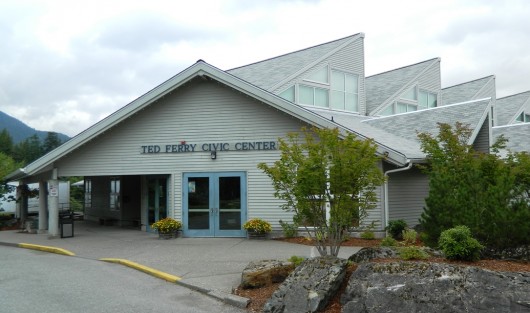The Ketchikan City Council has a full agenda for Thursday’s meeting, including a discussion of water and wastewater rates; and proposed parking enhancements at the Ted Ferry Civic Center.
The city’s water and wastewater departments have been running at large deficits, even with small, regular rate increases. In a memo to the Council, City Manager Karl Amylon and Finance Director Bob Newell write that the current rate structures do cover operating costs, but that leaves nothing for capital improvements or emergency maintenance.
Water rates, in particular, have been a topic of discussion because the current rate structure heavily subsidizes large commercial users, particularly fish processing plants. City officials have talked about metering those customers, and raising their rates to bring them closer to the actual cost of producing potable water.
 The memo states that the three fish processors — E.C. Philips, Trident Seafoods and Alaska General Seafoods — use about 48 percent of the water produced by the city, but pay for about 4.6 percent.
The memo states that the three fish processors — E.C. Philips, Trident Seafoods and Alaska General Seafoods — use about 48 percent of the water produced by the city, but pay for about 4.6 percent.
According to the city, the other top water users are the City of Ketchikan’s wastewater division, Vigor Alaska, the U.S. Coast Guard base, the City of Ketchikan’s harbors division, Ketchikan International Airport, the Inter-Island Ferry Authority and the Alaska Marine Highway System.
Metering all commercial customers, which was suggested previously, would cost the city about $1.8 million; and metering all customers would cost more than $5 million. That includes purchasing and maintaining meters, and creating the infrastructure to read them.
The memo gives some options for the City Council to consider: metering only the 10 largest customers and phasing in rate increases for those customers over three years; or postponing metering, but still increasing water rates for the largest customers.
Those options also call for continued, but smaller, annual rate increases for residential customers.
City managers have recommended similar strategies for wastewater rate increases, except without a special rate for seafood companies. Most of the water those customers use isn’t discharged into the city’s wastewater system.
Parking at Ted Ferry Civic Center has always been a challenge for popular events. In the past, the funicular at Cape Fox Lodge allowed people to easily park downtown and then ride up the steep hill to the Ted Ferry. But, the tram has had mechanical issues. Nonprofit groups that rent the city-owned Civic Center have asked for the city to help alleviate parking problems by funding a shuttle for those popular events.
While previous shuttle requests were approved, the City Council rejected a request for a shuttle during February’s Wearable Art Show. That vote sparked a conversation about how to improve parking at the Ted Ferry.
City Public Works Director Mark Hilson reports that Cape Fox is willing to let the city improve a cleared space that some people already have used for overflow parking. The proposed improvements would create about 34 additional parking spaces, but it would be an unlit, gravel lot, so winter use might be limited. That improvement work is estimated at $5,000.
If the Council would prefer a paved lot with lights, the improvements would cost more. In either case, the city likely would need to negotiate a lease agreement with Cape Fox for use of the site. Also, the 34 new spaces would not be sufficient additional parking for the most popular events.
Amylon writes in a memo that the city also could consider helping Cape Fox with repairs and maintenance of the funicular.
The Council also will vote on a proposed 7 percent increase to harbor rates. That rate increase already was approved by the Port and Harbors Advisory Board.
The Council meeting starts at 7 p.m. Thursday in City Council chambers. Public comment will be heard at the start of the meeting.






